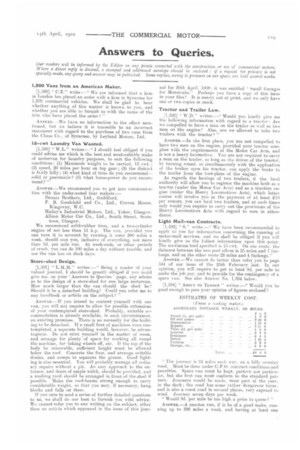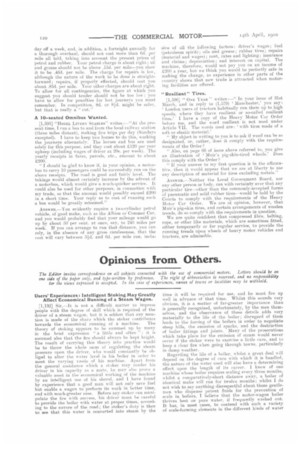Answers to Queries.
Page 17

Page 18

If you've noticed an error in this article please click here to report it so we can fix it.
Our readers will be informed by the Editor on any points connected with the construction or use of commercial motors. Where a direct reply is desired, a stamped and addressed envelope should be enclosed if a request tor privacy is not specially made, any query and answer may be published. Some replies, owing to pressure on our space, are held several weeks.
1,200 Vans from an American Maker.
[1,589] " C.Z." write:—" We are informed that a firm in London has placed an order with a firm in Syracuse for 1,200 commercial vehicles. We shall be glad to hear whether anything of this matter is known to you, and whether you are able to furnish us with the name of the firm who have placed the order? "
-ANSWER..—We have no information to the effect mentioned, but we believe it is traceable to an incorrect statement with regard to the purchase of two vans from the Chase Co., of Syracuse, by Leyland Motors, Ltd.
15-cwt Laundry Van Wanted.
11,590] " W.L." writes I should feel obliged if you could advise me which is the best and most-reliable make of motorvan for laundry purposes, to suit the following conditions: (1) Maximum weight to be carried, 15 cwt.; (2) speed, 20 miles per hour on top gear; (3) the district is fairly hilly; (4) what kind of tires do you recommend— solid or pneumatic ? (5) what horse-power do you recommend? "
ANSWKR.—WS recommend you to get into communication with the under-noted four makers:— Dennis Brothers, Ltd., Guildford.
F. B. Goodchild and Co., Ltd., Craven House, Kingsway, W.C. Halley's Industrial Motors, Ltd., Yoker, Glasgow. Albion Motor Car Co., Ltd., South Street, Scotstoun, Glasgow.
We recommend solid-rubber tires, and a two-cylinder engine of not less than 15 h.p. The van, provided you can turn it to account by running it some 300 miles a week, should cost you, inclusive of everything, not more than 5d. per mile run. At week-ends, or other periods of crush, you can do 100 miles a day without trouble, and use the van less on slack days.
Store-shed Design.
11,591] " L.M.M." writes:—" Being a reader of your valued journal, I should be greatly obliged if you could give me, on your 'Answers to Queries' page, any advice as to the design of a store-shed for one large motorvan. How much larger than the van should the shed be Should it be a detached building? Could you refer me to any handbook or article on the subject? "
ANSWER.—If you intend to content yourself with one van, you will not require to allow for possible extensions of your contemplated store-shed. Probably, suitable accommodation is already available, in such circumstances. on existing premises. There is no necessity for the building to be detached. If a small fleet of machines were contemplated, a separate building would, however, be advantageous. Do not stint yourself in the matter of room, and arrange for plenty of space for working all round the machine, for taking wheels off, etc. If the top of the body be removable, sufficient height must be allowed below the roof. Concrete the floor, and arrange suitable drains, and sumps to separate the grease. Good lighting is also essential. You will probably manage all ordinary repairs without a pit. An easy approach to the entrance. and doors of ample width, should be provided, and a washing yard should he arranged in front of the shed if possible. Make the roof-beams strong enough to carry considerable weight, so that you may, if necessary, hang blocks and falls ort them.
If von care to send a series of further detailed questions to us, we shall do our best to furnish you with advice. We cannot refer you to any writing on the subject, other than an article which appeared in the issue of this jour
nal for 30th April, 1908; it was entitled ' Small Garages for Motorcabs." Perhaps you have a copy of this issue in your files? It is nearly out of print, and we only have one or two copies in stock.
Tractor and Trailer Law.
'Jr ,592.1 " W.D." writes :—" Would you kindly give me the following information with regard to a tractor : Are we compelled to have a man on the trailer as well as two men on the engine? Also, are we allowed to take two trailers with the tractor? "
ANswEn.—In the first place, you are not compelled to have two men on the engine, provided your tractor complies with the requirements of the Motor Car Acts, and is not a heavy locomotive. You are not required to carry a man on the trailer, so long as the driver of the tractor, by turning round, or simultaneously with the application of the brakes upon his tractor, can apply the brake to the trailer from the foot-plate of the engine. As regards the haulage of two trailers, if the local authority will allow you to register the machine both as a tractor (under the Motor Car Acts) and as a traction engine (under the Heavy Locomotives Acts), which latter course will involve you in the payment of at least £10 per annum, you can haul two trailers, and at such times only would you require to carry out the provisions of the Heavy Locomotives Acts with regard to men in attendance.
Light Mail-van Contracts.
[1.593] " S." write :—" We have been recommended to apply to you for information concerning the running of motor-mail services, and we shall be obliged if you will kindly give us the fullest information upon this point. The maximum load specified is 15 cwt. On one route, the distance between the two post offices is 25 miles and 7 furlongs, and on the other route 23 miles and 4 furlongs."
ANSWER.—We cannot do better than refer you to page 544 of our issue of the 25th February last. In our opinion, you will require to get at least 8d. per mile to make the job pay, and to provide for the contingency of a spare van. See also Answer No. 1,594 below.
[1,594] " ABOrT TO TENDER " writes:—" Would you be good enough to pass your opinion of figures enclosed ?
" The journey is 24 miles each way. on a hilly country road. Must be done under G.P.O. contract conditions and penalties. Spare van must be kept, pattern not particailar, but the first van must conform to the standard pattern. Journeys would be made, most part of the year, in the dark ; the road has sonic rather dangerous turns, and is also a coast road in several places, very exposed to wind. Journey seven days per week.
"Would 9d. per mile be too high a price to quote? "
ANSWER.—A one-ton van, if it be of a good make, running up to 338 miles a week, and having at least one day off a week, and, in addition, a fortnight annually for a thorough overhaul, should not cost more than 6d. per mile all told, taking into account the present prices of petrol and rubber. Your petrol charge is about right; oil and grease should not be above .15d. per mile—you show it to he .46d, per mile. The charge for repairs is low, although the nature of the work to be done is straightforward ; repairs, if properly effected, should cost you about .85d. per mile. Your other charges are about right. To allow for all contingencies, the figure at which you suggest you should tender should not be too low : you have to allow for penalties for lost journeys you must remember. In competition, 8d. or 8W. might be safer, but that is really a" cut."
A 10-seated Omnibus Wanted.
[1,595] "HOTEL LIVERY STABLES" writes :—"At the present time, I run a bus to and from the local railway station (three miles distant), making five trips per day (Sundays excepted). I have to keep two horses to do this, working the journeys alternately. The horses and bus are used solely for this purpose, and they cost about £120 per year upkeep (including wages of driver at 20s. per week). The yearly receipts in fares, parcels, etc., amount to about £200.
" I should be glad to know if, in your opinion, a motorbus to carry 10 passengers could be successfully run on the above receipts. The road is good and fairly level. The takings would almost certainly increase by the advent of a motorbus, which would give a much-quicker service. It could also he used for other purposes, in connection with my trade, so that the amount would possibly exceed .-f.:200 in a short time. Your reply as to cost of running swim a bus would be greatly esteemed."
ANSWER.—You evidently require a two-cylinder petrol vehicle, of good make, such as the Albion or Commer Car, and you would probably find that your mileage would go up by about 50 per cent, at once, say, to 240 miles per week. If you can arrange to run that distance, you can rely, in the absence of any gross carelessness, that the cost will vary between 50. and fid. per mile run, inclu
sive of all the following factors : driver's wages; fuel (petroleum spirit); oils and grease ; rubber tires; repairs (material and wags); rent, rates and lighting ; insurance and claims ; depreciation; and interest on capital. The machine, therefore, would not pay you on an income of L:200 a year, but we think you would be perfectly safe in making the change, as experience in other parts of the country shows that new trade is attracted when motoring facilities are offered.
" Resilient " Tires.
[1,596] " ONE YEAR" writes :—" In your issue of 31st March, and in reply to (1,579) Manchester,' you say: ' London users of tractors habitually run them up to high speeds, where they have resilient or so-called resilient tires.' I have a copy of the Heavy Motor Car Order before me, and the word resilient is not used under Article VII The words used are: ' with tires made of a soft or elastic material.'
" My object in writing to you is to ask if wood can be so designated. or, rather, does it comply, with the requirements of the Order ?
" Also, on page 66 of issue above referred to' you give an illustration of Mnir's pig-skin-tired wheels.' Does this comply with the Order ?
" If your answer to my first question is in the affirmative, then it would appear that we are at liberty to use any description of material for tires excluding metals."
ANSWER.—Neither the Local Government Board, nor any other person or body, can with certainty aver that any particular tire—other than the commonly-accepted forms of pneumatic and solid rubber tires—would be held by the Commits to comply with the requirements of the Heavy Motor Car Order. We are of opinion, however, that Muir's pig-skin tires, and certain arrangements of wooden treads, do so comply with the requirements in question. We are quite confident that compressed fibre, belting, rope, or other like materials, which are sometimes fitted, either temporarily or for regular service, to provide the running treads upon wheels of heavy motor vehicles and tractors, are admissible.






















